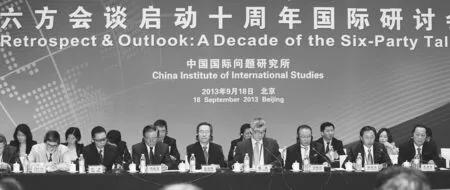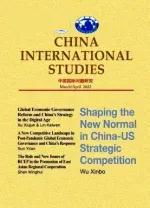Keynote Speech by Mr.Kim Kye Gwan,First Vice Minister of the Ministry of Foreign Affairs, DPRK1
2013-12-11金桂冠
First of all, I would like to thank China Institute of International Studies (CIIS) for its constructive efforts to initiate and host this international seminar on the eighth anniversary of the September 19th Joint Statement in this beautiful season of blue sky and golden harvest.Meanwhile, I would like to thank President Qu Xing and other gentlemen of CIIS for your kind invitation which enables us to participate in this significant seminar and voice our opinions.Our special thanks go to Foreign Minister Wang Yi and other comrades of the Chinese Foreign Ministry - thank you for having created such a meaningful opportunity and the great care and hospitality you have shown to us.
Had the delegation leaders of all six dialogue countries shown up timely based on the original schedule proposed by China, an earlier restart of the six-party talks would surely have been possible.However, due to lack of preparedness on the part of some participating countries, this was not achieved.Nevertheless, we still appreciate China’s good initiative in this respect.
Next, I would like to talk about the success and significance of the September 19th Joint Statement.
Eight years have passed since the September 19th Joint Statement was made.In retrospect, this joint agreement reached among the six parties for the first time in history is the result of more than two years of intricate and hard work.This is because countries in Northeastern Asia have different thoughts, political beliefs and social institutions and among some countries there still exist hostility, obviously a legacy of the Cold War.As a result, the situation in this region is much more complicated than that in other regions of the world.Therefore, reaching an agreement among the six parties on regional peace, stability and common growth is already a very challenging and complex task in itself.Every single article, every single sentence and every single word of the Joint Statement, which relates the intentions and meanings of the negotiators, is a full testimony to the painstaking efforts they have made.In this process, China as the host country,and Comrade Wu Dawei in particular, have made strenuous efforts and played a leading role.
Such a hard-won Joint Statement not only outlines the goals and principles for the denuclearization of the Korean Peninsula, but also the duties and obligations of the parties concerned.It encompasses in an integrative and well-balanced manner a series of issues,including denuclearization, normalization of diplomatic relations,substitute energy compensation, establishment of peace mechanisms,etc.Further, it prescribes a solution based on the spirit of respect and equality and the principle of synchronized action and phased implementation.These represent the very essence and significance of the Joint Statement, because it is these important points that have,to some extent, safeguarded the peace and stability of the Korean Peninsula and Northeast Asia at large.
The agreement on Phase I measures of the September 19th Joint Statement was reached on February 13th, 2007 and then fulfilled.After that, Phase II measures were announced on October 3rd, 2007 and diligently carried out as well.We, for the sake of the Korean Peninsula’s denuclearization, have been magnanimous and made honest efforts to fulfill our duties and obligations.
Next, I would like to say a few words about lessons and prospects.
Had the September 19th Joint Statement been thoroughly and completely carried out, it would have certainly helped resolve the Korean Peninsula nuclear issue and contributed to regional and world peace and security.Regretfully, the Joint Statement as a result of the six parties’ brainstorming and painstaking efforts has not borne the fruits it ought to bear.
The reason is that some participating countries, deliberately dodging their own duties and obligations assigned to them by the Joint Statement, misguided the media by saying that only the DPRK should fulfill its duties and obligations under the Joint Statement while they themselves did not have to take any concrete measure to perform their own duties and obligations.Just as stronger light produces heavier shadows, the spotlight has always been on our denuclearization efforts, while all other important goals and objectives of the Joint Statement are deeply buried in the dark shadows.

DPRK First Vice Foreign Minister Kim Kye Gwan makes a keynote speech at the seminar, calling for dialogues among the parties concerned.
The cause of the nuclear issue in the Korean Peninsula, i.e., the hostile relationship between the DPRK and the United States, has not been removed.Instead, it has deteriorated.With America’s nuclear threat to the DPRK looming large and becoming more practical,issues such as normalization of diplomatic relations and creation of peace mechanisms, etc.could not be possibly negotiated at all.As a result, the denuclearization process has been continuously reversed,until we can no longer afford to be bound by unilateral obligations now.
Reality shows that if other important goals of the Joint Statement are not achieved, the goal of achieving denuclearization in the Korean Peninsula will not be easily realized.Further, it proves that no substantial progress can be made if the basic spirit and implementation principles of the Joint Statement are violated.
This is the lesson we have learned after reviewing what has happened in the past six months.
One of the important objectives of the September 19th Joint Statement is the denuclearization of the Korean Peninsula.This has not only been the wills of President Kim Il Sung and General Secretary Kim Jong Il but also the policy objectives of our Republic.However, the denuclearization of the Korean Peninsula cannot be achieved only by the DPRK making unilateral efforts, nor can it be realized by focusing only on any single aspect of the issue.To effectively realize denuclearization on the Korean Peninsula, all six parties involved in the September 19th Joint Statement must work together to achieve other important goals and objectives stated in the Statement by thoroughly observing the Statement’s basic spirit and implementation principles.
The September 19th Joint Statement has been cultivated in the course of dialogues.It is a seed that promises to blossom and bear fruits only through dialogues.And the six-party talks are one of the diplomatic arenas to solve the nuclear issues.Therefore, we have expressed our support to the six-party talks.No matter whether it is official Six-Party Talks or small-scaled dialogue within the sixparty framework, we all choose to participate without caring too much about forms and formalities.We welcome dialogues without preconditions, because setting preconditions to dialogues would harm trust-building and lead eventually to distrust.Asking us to take actions first before talks even restart is an unreasonable demand that runs counter to the agreement spirit of the September 19th Joint Statement.
As stated repeatedly in the past, we are in support of the restart of the six-party talks and will make continued efforts to that end.However,we will never beg for dialogues.The prospects of the September 19th Joint Statement depend on to what extent the important goals and objectives of the Joint Statement can be achieved in a well-balanced manner and whether the basic spirit and action guidelines stated in the Joint Statement can be observed.
We shall follow the wills of our great marshals and make continued efforts in good faith for the full denuclearization of the Korean Peninsula.
On board the boat of “six-party talks” in China I have already found myself a good seat.I hope all other participating countries can get quickly onboard and find their seats too, so that our boat can set sail as soon as possible.
Thank you.
